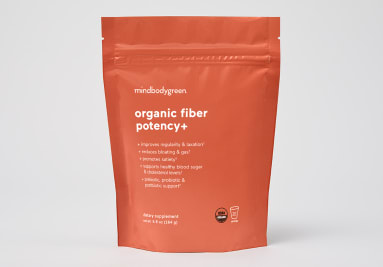
Image by Sergey Filimonov / Stocksy
November 23, 2022
The world is acutely aware that having a healthy gut supports smooth digestion, but a lesser few consider the comprehensive impact of nourishing your gut daily (think immune function, mental well-being, natural detoxification pathways, and even skin health). Today, maintaining a diverse and abundant microbiome of “good” bacteria is a well-known part of maintaining whole-body health.
But how, specifically, are you supporting your gut health? Many consider probiotics and fermented foods to be the pinnacle of GI health, but those of us who have struggled with digestive issues, mood, and a suboptimal immune response know firsthand that promoting a healthy gut takes more effort and intention than drinking a daily kombucha. Enter: fiber.
Advertisement
This ad is displayed using third party content and we do not control its accessibility features.
6 ways fiber promotes gut health:
1.
Supports a diverse & abundant microbiome.
Like a luxury car, the colonies of microbes in your gut need plenty of premium-grade “fuel” (i.e., prebiotic fibers) to help them grow and thrive.
Fermentable fibers (aka prebiotics) from complex carbohydrates (think legumes, sweet potato, ginger, and flaxseeds) are the plant fodder needed to support healthy gut microbiota composition and function.
According to a 2021 Nutrients review, dietary fiber provides multiple sources of fuel and nourishment for fermentation reactions via specific species of beneficial gut microbes, and increasing your fiber intake helps expand the population and diversity1 of these good bugs.
On the flip side, the review notes that diets low in fiber-rich foods (i.e., fruits, vegetables, whole grains, legumes, and seeds) are associated with reduced microbial diversity in the gut.
An abundant and diverse gut microbial ecosystem is where it’s at, and regular and adequate consumption of plant fibers is simply pivotal in that equation (which is why our nation’s massive fiber gap is both shocking and genuinely concerning).
Advertisement
This ad is displayed using third party content and we do not control its accessibility features.
2.
Promotes SCFA production.
3.
Bolsters gut barrier function.
One type of SCFA, called butyrate, is especially effective in sustaining the integrity and resilience of the gut lining, which covers significant surface area inside our body and after our skin is our next line of defense. According to a 2018 Advances in Nutrition review, butyrate helps support intestinal barrier function3 and mucosal immunity (more on that in a bit).
Consuming guar bean fiber, the leading organic fiber featured in mindbodygreen’s organic fiber potency+ formula, has been shown to support butyrate-producing bacteria—which, in turn, can help strengthen the integrity and resilience of the gut lining.*
Advertisement
This ad is displayed using third party content and we do not control its accessibility features.
4.
Aids digestion & gut motility.
Insoluble fiber creates the “bulk” of stool. It passes through the digestive tract undigested, which promotes gut motility4—i.e., the movement of food through the digestive system and out of the body. On the other hand, soluble fiber dissolves easily in water and retains it, helping control and slow the digestive process (such as the absorption of certain nutrients).
Consuming enough of both types of fiber is absolutely essential to maintain a healthy digestive system and keep things “moving along.”
5.
Supports healthy bowel movements.
Speaking of evacuations… In addition to promoting gut motility, fiber also promotes healthy stool formation by regulating intestinal microbiota5. In one study published by the Saudi Journal of Gastroenterology, guar bean fiber was found to help increase the frequency and quality of bowel movements and reduce colonic transit time.*
In another study from Nutrition Research, green kiwifruit (another premium plant fiber in mbg’s organic fiber potency+) was found to significantly increase daily bowel movements6.* Whether you’re upping your daily fiber intake with fiber-rich plant foods or a quality supplement (both are useful and synergistic strategies), it’s clear that getting sufficient fiber promotes regularity.*
Advertisement
This ad is displayed using third party content and we do not control its accessibility features.
According to a 2021 Nutrients review, 70 to 80% of immune cells7 reside in the GI tract. That’s right, the majority of your immune system is located in your gut! Intestinal microbiota (those good bugs), the gut epithelial lining (a physical barrier), and the local mucosal immune system all work together throughout the day to bolster the body’s immune response.
All dietary fiber (but especially prebiotics) and probiotics are integral in promoting gut-immune health by helping maintain gut lining function and integrity, promoting SCFA production, and supporting gut microbiome abundance and diversity.
The takeaway.
Increasing your dietary fiber intake is one of the best things you can do to promote overall gut health, immune response, and regularity.
In addition to packing your plate full of fiber-rich foods, a high-quality daily fiber supplement like mbg’s organic fiber potency+ is an easy way to help ensure that you and your family are bridging the fiber gap each and every day. Featuring a USDA-certified organic, vegan blend of soluble, insoluble, and prebiotic plant fibers from clean and science-backed sources (i.e., organic guar bean, mushrooms, and green kiwifruit), plus a targeted probiotic strain, this plant-powered formula helps nourish your gut barrier and microbiome, support digestion, and promote regularity.*
If you are pregnant, breastfeeding, or taking medications, consult with your doctor before starting a supplement routine. It is always optimal to consult with a health care provider when considering what supplements are right for you.


